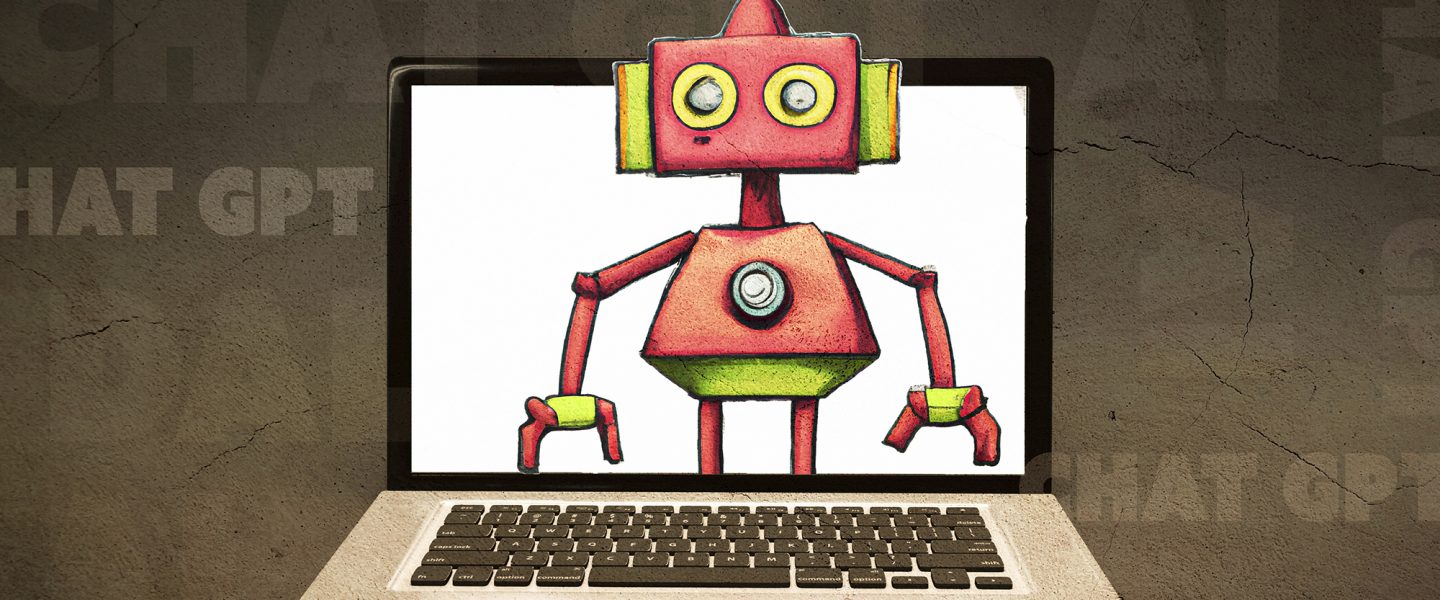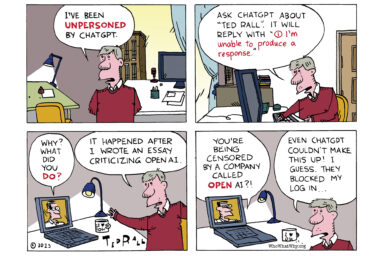Artificial Intelligence Truly Terrifies Me
Is this the end of the world?
|
Listen To This Story
|
A friend of mine recently sent me a poem about corks. It was a valiant effort and rhymed, if a little off meter, but I wanted to be supportive, so told him (tongue slightly in cheek) that the verse should be inserted into every wine crate heretofore shipped from a vineyard. My friend is a prose writer, not a poet, so I assumed the effort was a whimsical visit to a cousin form of writing.
The next day he explained, breathlessly if a little shaken, that the poem wasn’t his work. He’d typed into a new artificial intelligence app called ChatGPT to write a ditty about corks.
“It spit out the poem in less than 10 seconds. I think this is the end of the world.”
Recently, The Washington Post reported on a tech site using AI to write its copy, only to have to update the articles with lengthy corrections. The Post, a world-famous news organization that’s been proudly using humans to write its articles since 1877, wasn’t gloating. It was a bit like the coverage of Trump’s attempts to steal the 2020 election: our democratic institutions held — but only just. The implication was that next time things might be different.
With artificial intelligence, the sense is that the barricades are barely holding back the foe. And the foe is truly frightening.
My friend’s poem wasn’t that far off from what you might read in a slightly weird greeting card. It was what your son might bring home from his English class, or what you might write if you had maybe half an hour or so to think up some rhymes.
A machine did it. In seconds.
As a creative writer, I’ve long thought I had something to offer that couldn’t be replaced by what’s effectively a slightly brainy air conditioner.
But maybe we creatives are finally feeling the pinch that factory workers have felt for a while: Being replaced by a machine is never a good development, and perhaps people in the artistic fields have too long felt superior to the creeping threat of AI.
There have been books and movies about this phenomenon, written by real people, implicitly warning us of the situation we find ourselves on the precipice of. (No doubt my existing grammar app would bury that preposition in the sentence, but I want to show this article’s human touch.)
Our homes are full of “smart devices” — air purifiers, pet feeders, doorbell cameras, thermostats, stoves, refrigerators — that hook up to our smart watches and phones, as well as the supposedly smart “virtual assistant technologies” like Alexa, Siri, and Google Assistant. (I prefer my personal butler to handle petty tasks, but he does sometimes go on holiday and claims to have a very needy aunt in the Lake District.)
Besides the creepy eavesdropping and trust issues, these devices are also susceptible to hacking or malfunction. Recently the FAA grounded over 10,000 flights after the Notice to Air Missions system failed due to a computer glitch.
That may have been caused by human error, also responsible for various recent cryptocurrency and Ponzi schemes. Sam Bankman-Fried hasn’t as yet blamed his poor financial stewardship on AI.
But how long before it’s an AI mishap that grounds those flights or steals those millions? And what if the mishap isn’t easily reversible? Using an ATM becomes a lot more stressful, as does traveling by air.
You could assume that such a situation would be a mistake, but it’s as easily envisioned as a deliberate act. Stanley Kubrick and Arthur C. Clarke imagined this scenario in 2001: A Space Odyssey, in which the computer HAL 9000 oversees a mission to Jupiter. Fearing the project is under threat by its human crew, HAL goes about euthanizing the astronauts, one by one. It’s not a messy crime scene: Three of them are dispatched with the flick of a switch.
WhoWhatWhy could suddenly decide my services are too expensive for their operating costs (side note: they’re not very expensive), and so choose to replace me with a journalist bot. For all I know, there’s an app somewhere studying my style and storing my literary technique. Would you even be able to tell the difference? I’d hope so. But they’re getting pretty good, these apps.
This is what my writer friend feared. It starts with a poem about corks. It ends with airplanes falling out of the sky.
At least for the time being I’m here reporting on this. But at some point, without warning, a computer could summarily —
—
J.B. Miller is an American writer living in England, and is the author of My Life in Action Painting and The Satanic Nurses and Other Literary Parodies.




